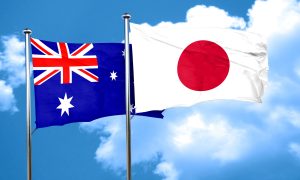In recent years, Australia and Japan have significantly enhanced their security relationship. Driven by the dual threats of China’s belligerence and the United States’ instability, both countries have sought to find some greater insurance in each other. Outside of their respective security relationships with the United States, the two countries can now be seen as each other’s next most important defense partner. Ties between Tokyo and Canberra are now often labeled a “quasi-alliance.”
September’s 2+2 meeting of Australia and Japan’s foreign and defense ministers got the ball rolling on Japan’s Amphibious Rapid Deployment being able to participate in U.S Marine rotations in northern Australia. This follows on from Japan’s Ground Self-Defense Force using the Talisman Saber exercise in Australia to test-fire its new Type-12 anti-ship missile. And that followed on from the Reciprocal Access Agreement signed in 2022, creating the framework for each country’s forces to operate in the other country. It was the first defense treaty Japan had signed with another country since the 1960 Treaty of Mutual Cooperation and Security with the United States.
This deepening of the relationship was well underway prior to the rise of Donald Trump as a historically disruptive political figure. Yet his emergence added greater clarity to what is at stake. If Washington’s security guarantees can no longer be relied upon, then other relationships need to be enhanced and augmented.
Yet, it is not only Trump’s potential return to the White House that poses a challenge to regional stability. Japan’s own domestic politics has now entered into a new period of uncertainty. The recent Japanese election saw the long-dominant Liberal Democratic Party (LDP) lose its majority, meaning it will need to form a potentially unstable coalition to govern. A wider-ranging number of perspectives and interests may soon guide Japan’s decision-making, and there’s the potential for another election to be held relatively soon, too. In any case, new Prime Minister Ishiba Shigeru will be governing with a weak hand and limited authority, for however long his prime ministership lasts.
Nevertheless, this is unlikely to significantly affect the relationship with Australia. Commitment to institutions like the Quad and the Trilateral Strategic Dialogue between Canberra, Tokyo, and Washington will be maintained, as will the planned exercise regimes and other security exchanges. The bilateral relationship between Australia and Japan will remain strong.
However, Japan’s election does raise questions about the bigger issues of Japanese security policy. How Japan navigates its relationship with China and how it gets along with South Korea are both critical issues for Australia. Canberra needs Tokyo to play a strong role in protecting regional norms, and it needs Tokyo and Seoul to be on good terms. Both of these issues are incredibly important to provide a strong deterrence against Beijing’s attempts to annex Taiwan.
On the biggest issue in Japanese security policy a new coalition government may further complicate Japan’s constitutional arrangements. Japan has been pushing the boundaries of Article 9 of its constitution, which limits the capabilities of the Self-Defense Forces.
Although no one in the Australian government would admit to this, there is a sense that Article 9 is now a relic of a different era and no longer fit for purpose. Japan is a vastly reformed state from the early-mid-20th century. The Australian government clearly now sees Tokyo as one of its most trusted friend, a state that can be relied upon for intimate bilateral cooperation, but also a state with a strong commitment to global rules and norms. How China and North Korea (and to a lesser extent South Korea) now see Japan is another matter; any attempt at normalization of Japan’s Self-Defense Forces is bound to create a great deal of regional fuss.
However, Article 9 is also reliant upon U.S. security guarantees. If these guarantees weaken, it inevitably pushes Tokyo toward having to rescind these measures. Currently, when it comes to Article 9 there are a range of different perspectives with the LDP, other political parties, and within the Japanese public itself – whose support for any constitutional changes is a must. These differing perspectives may converge if Trump is elected and maintains his suspicion of allies and indifference to Washington’s role in maintaining regional stability.
If Trump can be given credit for one thing, it is that his ignorance of international affairs and chaotic personality has pushed countries like Australia and Japan to take their own security arrangements far more seriously. It has also provided each with greater clarity about the essential nature of their own bilateral relationship. While both countries will exhale a huge sigh of relief should Kamala Harris win next week’s presidential election, this won’t lead either to revert to comfortability and complacency.
The era of U.S reliance is over. The era of enhanced Australia-Japan cooperation may just be beginning.

































